Writing Summary For The Week Ending 11/30/2023

After Raffaello Sanzio, called Raphael:
Seated Youth Writing in Book (17th/18th century)
I Am Not As Advertised
The freshly shaven yard looks more like a golf green than anything I should be walking on. I remind myself just how powerful I always was when wielding a simple fine-toothed steel-tined rake, standing up the grass, wrenching out tangles and moss. The soil underneath seems more moist than it's been since last December, with tiny, shiny red ornamental crabapples hiding in the crevices. A flight of geese startles from the nearby creekbed, fleeing into the past participle of themselves in the process: A Fluck of Geese. The scents and colors suggest Galacia, some Old World land between empires. I am a peasant at heart here, and may I always remain one. I tried to take comportment lessons, to dress in the proper colors for each season, and to become invisible in the hope of fitting in. Proper society struggles to permit requisite variety, and so always works to undermine its stated intention. I write, and so I eventually tend to embarrass myself. I am not as advertised, thank heavens, and am in no need of reform.
Enormity
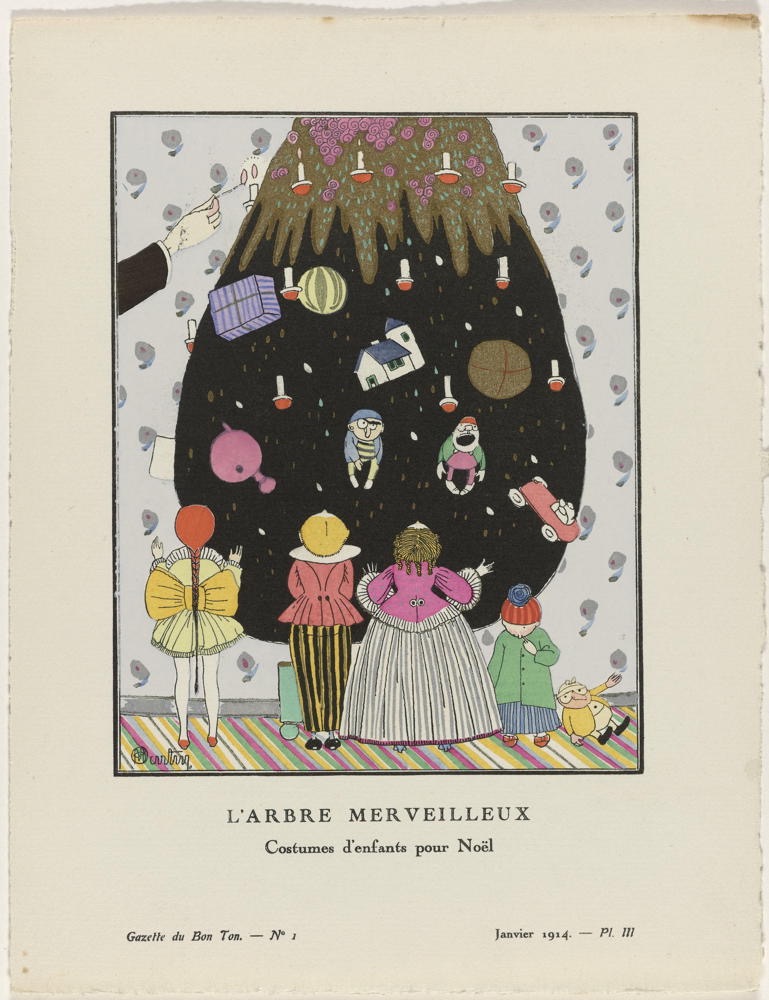
Charles Martin:
Gazette du Bon Ton, 1914 - No. 1, Pl. III:
L'Arbre Merveilleux / Costumes d'enfants pour Noël (1914)
"The magic only ever comes after I feel overwhelmed enough… "
Once the leaves fall, the street opens up, appearing much broader and longer than during Spring or Summer. With winter closing fast, the world seems to be expanding. Its expectations stretch, too. I feel humbled by the sheer Enormity of the upcoming weeks. They seem irreducibly huge, and I feel incapable of coping with the expectations they bring. More threat than promise, the holiday season falls upon us, bringing a fresh set of obligations while we seem to have yet to greatly expand our capacities. These two hands will not become three regardless of the needs encountered. These two feet will slip when the street freezes. Socks have already become a mandatory part of the standard uniform again. I feel like Atlas, expected to hold the world on my shoulder, or Sisyphus, rolling the world uphill like a boulder, only for it to slip back toward the bottom again and again. It's Autumn for a reason.
I suspect that fresh challenges feel overwhelming for that reason.
Indecision

Odilon Redon: Profile of Shadow (c. 1895)
"I'm still not doing anything except not deciding yet."
Growing up in the Inland Northwest provided ample opportunity for me to study the fine art of Indecision. I've seen innumerable books touting The Art Of Decision-Making, but I've seen none promoting its equally important opposite, for Indecision seems every bit as essential, if not more so, as its counterpart. Here, for instance, the winter weather patterns offer almost endless Indecision points. The Muse and I were planning to drive to the state's Western side. Which route should we take? In November, the mountain pass route rarely seems the best choice, for capricious snows and such complicate passage. The alternate route, down the vaunted Columbia Gorge, also offers complications with notorious winds and frequent weather changes. Two days out, Indecision rules, and while it might seem necessary to—just Decide, already!—the tenets of Indecision counsel otherwise.
In this culture, Indecision is widely considered the eighth mortal sin, following and resembling sloth, for Indecision seems like nothing, and nothing's never considered a viable choice.
Conventions

Attributed to Firuz Mirza Nusrat al-Dawla:
Practice Calligraphy [Siah Mashkh] (c. 1850-1886)
"Writers create by means of surface imperfections."
Each profession and every practice holds certain principles and actions as necessary and sufficient. We, especially fellow practitioners, hold anyone claiming to practice a discipline responsible for exhibiting these skills. Innovation comes from flouting these rules, often at the cost of early adopters' reputations. Early in his career, the art establishment did not hold Matisse to be a very skilled painter. He flouted color Conventions, for instance. The earliest Impressionists couldn't paint straight, apparently incapable of reproducing with photographic integrity. The earliest abstractionists were considered crazy, mainly because the orthodoxy could not comprehend the artists' Conventions, which were still evolving. Eventually, Matisse came to exemplify an evolved set of Conventions, as did the impressionists and abstractionists, though their Conventions, too, were later flouted by upstart practitioners.
Paul Lynch, who won this year’s coveted Booker Prize, declared, “Well, there goes my hard-won anonymity,” as he accepted his prestigious prize.
ThePalouse
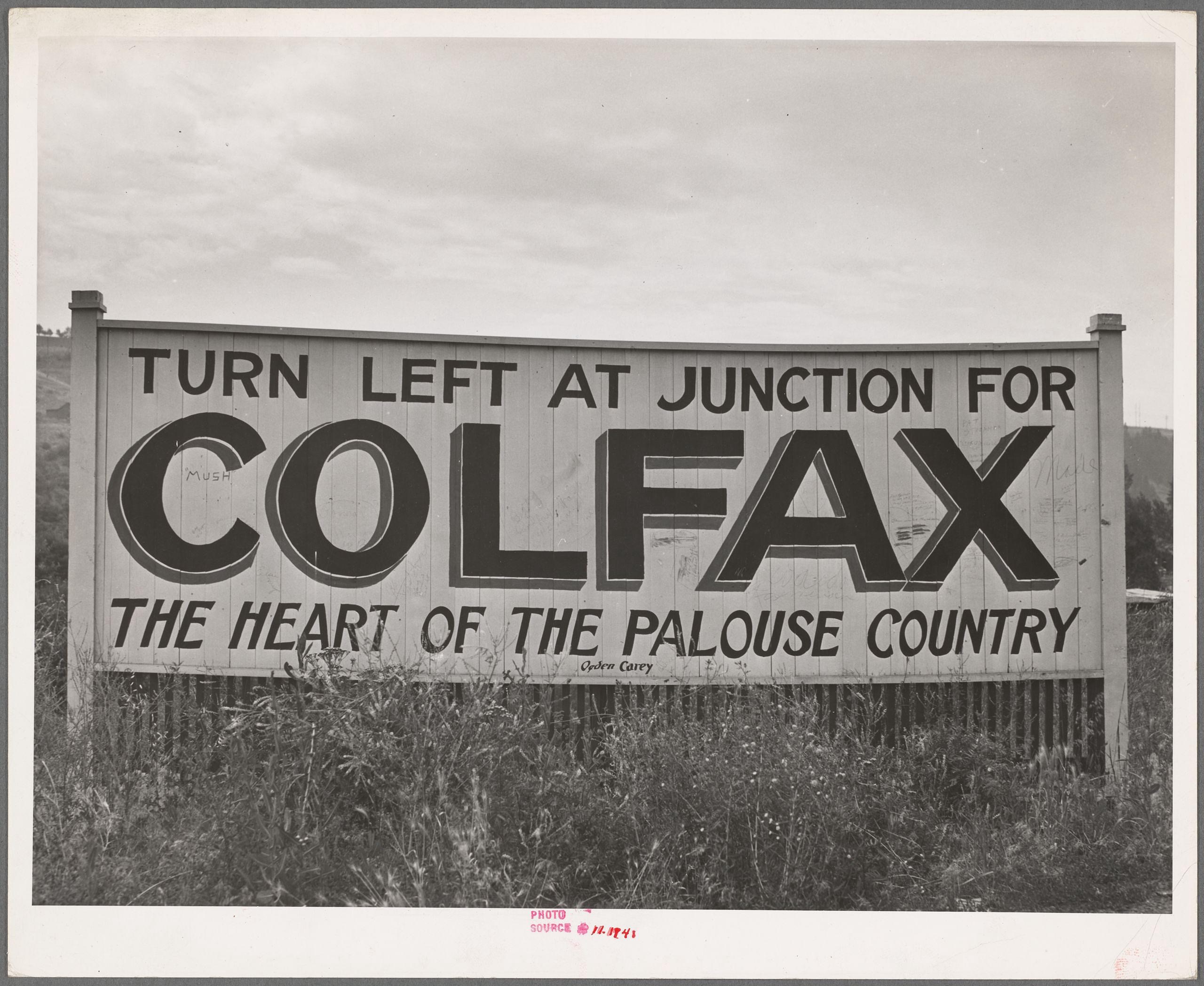
Russell Lee: Sign. Whitman County, Washington.
The Palouse country is most famous for its extensive wheatland
(1941)
" … dense fog settled around us."
Just to the north of this valley lies a rare country on this continent and in this world. Loess hills define Palouse Country, an area South of Spokane and West of Idaho, East of I-90, and North of the confluence of The Snake and Columbia Rivers, something less than a hundred miles square. Within this space lies considerable space, as if wide open was reimagined and arrayed in three full dimensions. Within its confines, tiny towns and isolated wheat stations dot a rolling landscape where wheat and lentils grow, and some of the finest barns anywhere stand. Driving through ThePalouse has always been a cleansing, a new beginning, a small vacation into another world.
I can't imagine ThePalouse when I'm not embedded within it.
Trajectories

Giorgio Ghisi?, After Giulio Romano:
The Prison (16th century)
" … Trajectories upon which I warmly rely."
This week, I stumbled upon a short video of astrophysicist Neil deGrasse Tyson describing what science has discovered about the afterlife. He was brief and unemotional as he explained that neither biology nor physics has anything to say about the subject. Neither field has uncovered any evidence that such a state exists in nature. Of course, other fields exist. Theology, for instance, seems to have little to say besides afterlife commentary, though different branches have produced different stories. Most theologies at least agree that such a state exists, though they, too, lack the observable proof any physical science requires. Theology and related fields inject a property science refuses to employ: belief. They circle their square by insisting that their perspective only works; indeed, it was only ever intended to work for those exhibiting steadfast and unshakeable belief in it. Their philosophy seems to sum to, "If you believe in it, it will manifest."
I have long jealously admired the facility with which true believers navigate this world.
NaughtKnowing
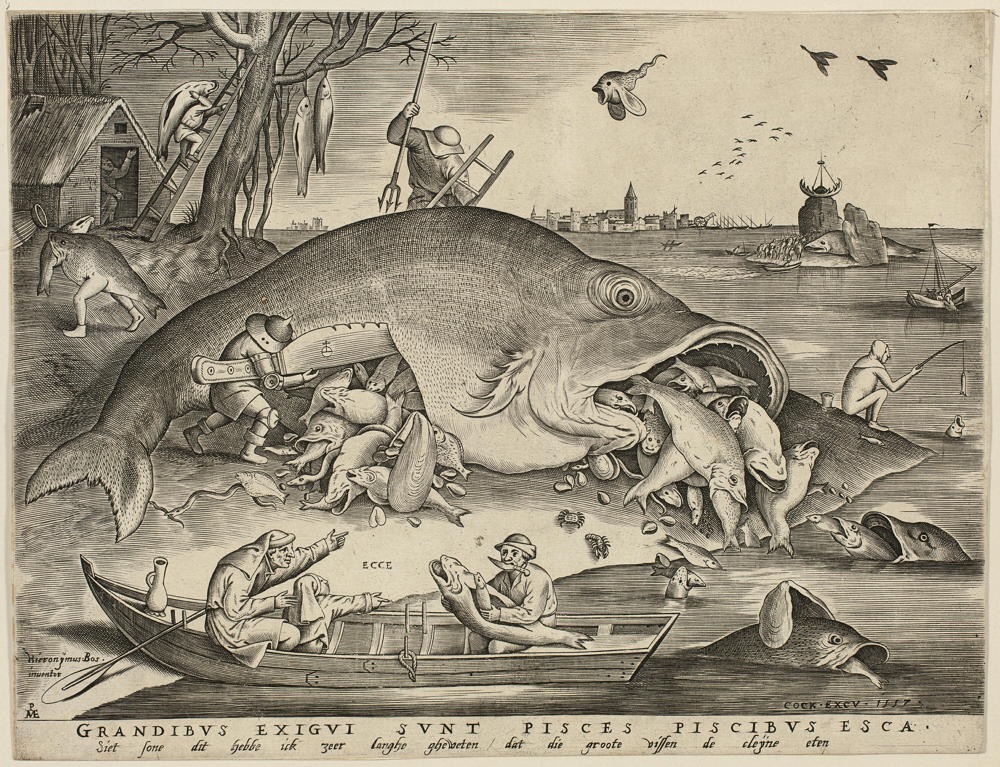
Pieter van der Heyden
after Pieter Bruegel, the elder
published by Hieronymus Cock:
Big Fish Eat Little Fish (1557)
“I hope somebody influential is praying for us.”
The cobbler and I inhabit different worlds. As I appreciated him for fixing that pair of boots, I asked him how long he thought he might continue practicing his craft. "Well, I turn seventy next week," he replied. "It mostly depends upon how long the government will let me continue." What followed left me gasping. The most remarkable spew of hearsay and innuendo I'd ever heard described a world I was not familiar with, one where our government conspires against innocent shop owners to undermine their lifestyles. "That carbon tax should have been put to a vote. It's illegitimate and will eventually raise the gas price by a dollar a gallon!" As if that would be a bad thing. How else could our government convince people to use less gas if it doesn't raise the price of it?
After The Muse and I made our awkward escape, I realized that I'd witnessed Confirmation Bias in action.
Writing Summary For The Week Ending 11/23/2023

Pierre-Paul Prud'hon: Dr. Thomas Dagoumer (1819)
The Fussing Seems Eternal
I often wonder what benefit my writing provides. I engage in the sometimes requited belief that engaging might eventually accomplish something, though the progress most often seems slow and almost begrudging. Some weeks, I could swear nothing happened. Other weeks seem filled with insights and other visitations. This writing week represented a transition from a period where it might have still been possible to deny the encroaching winter into when that would no longer seem plausible. Denial or acceptance seem the stark choices. I usually tend toward choosing both, investing without going all in and denying without constructing much of a believable argument against. I often feel in suspense, between, impending. This week, I seem to have successfully transitioned from before into now, from past into my next future. I have a scant month remaining before this GoodNuff Series will be finished. I suspect that this series has been progressing normally. Once I've cleaned up the leaves, I move on to other fussing. The fussing, though, seems eternal.
Prep
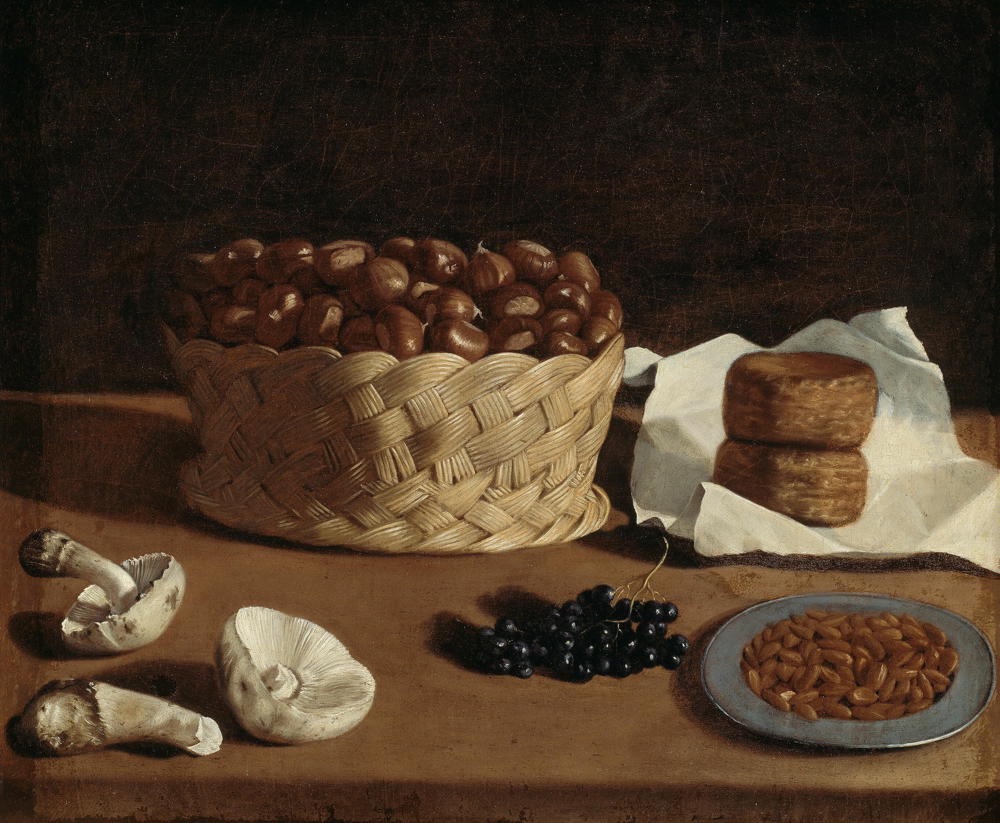
Attributed to Paolo Antonio Barbieri:
Kitchen Still Life (c. 1640)
"Bless all those less fortunate than us."
The Muse and I celebrate holidays primarily through Prep. The actual feast always turns out okay, but it takes so little time compared to completing the steps leading up to the sitting. Prep typically starts weeks in advance, with The Muse initiating some of the effort. In between, there's much gathering and sorting, considering and deciding, baking and boiling. There were times, much earlier in our relationship, when all this effort seemed unique. Now, it's taken the form of ritual, still unique enough but also terribly familiar. We solve few mysteries between larder and table, besides the pedestrian kind of finding key ingredients like Giblets. We're not interested in what The Post and Times suggest we include on our menu, for we're observing traditions stretching back generations. And, no, there will be no Jello® salad served.
I say "we" when I mean "she” for The Muse performs the bulk of the Prep.
Fogging
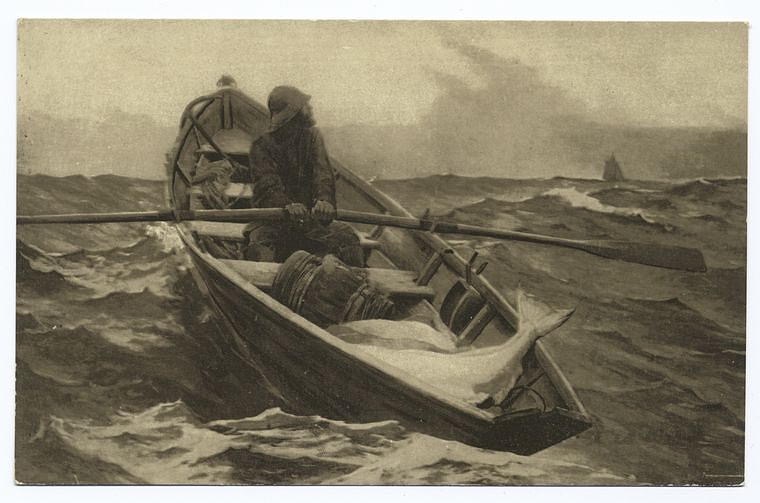
Winslow Homer: The Fog Warning (1905 - 1915)
" … remind us what we cannot see …"
I hail from the country Rudolf The Red-Nosed Reindeer must have hailed from. Come November, and through into the following year, we experience deep, sometimes freezing fogs. We locals curse their arrival as our nearby neighbors enjoy clear skies. We valley-dwellers know the curse. We lose our horizon. We lose our stars. We cannot see to the end of our own block. We drive as if suspended within space and time, both more visible than useful. We hear of the Fog of War but know The Fog of Everything, for fog becomes our baseline experience through those darkening weeks. We have The Fog of Breakfast, The Fog of Lunch, The Fog of Supper, as well as The Fog of Midnight and The Fog of Noon. Veterans have spent at least one night in Seattle after their late-night flight was forced back due to limited landing visibility here. We could see clear down to the ground but not straight ahead. Fog messes with your head.
I'm trying a fresh attitude toward our hazy resident this season.
Hexpectations
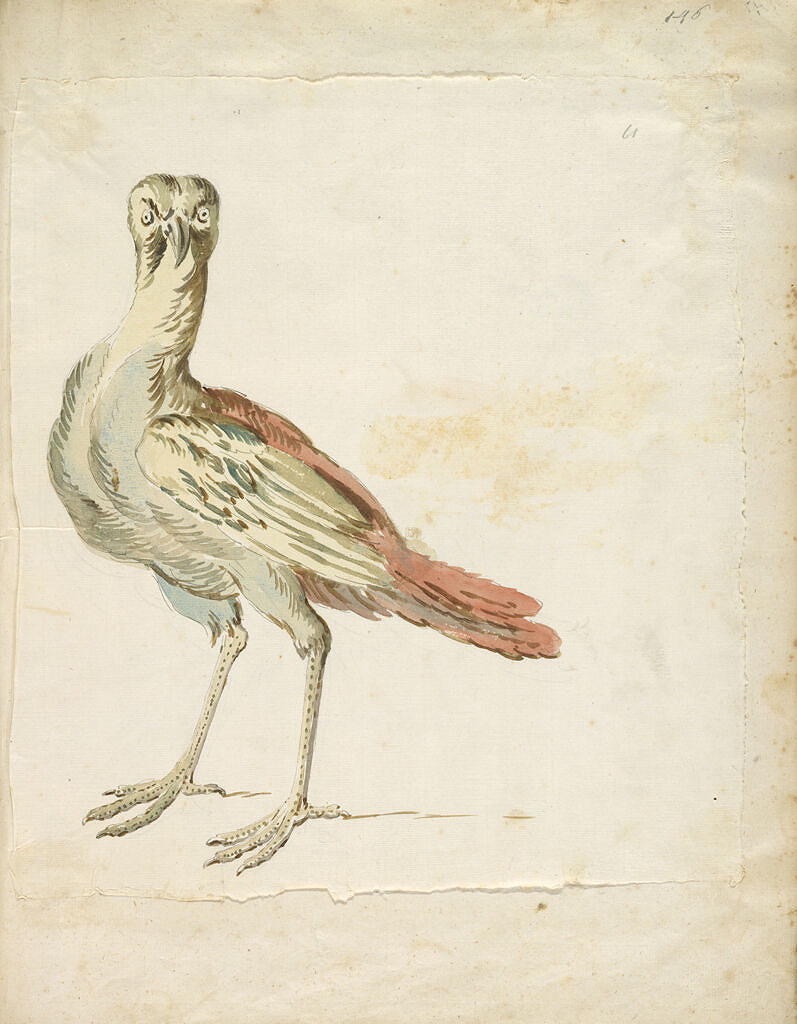
Jean-Baptiste Oudry:
Quizzical Bird; verso: blank (18th century)
"You might not ever be the master of your fate …"
I began my rounds confident that my mission would fail, for I had declared the unlikelihood of success as a part of my mission statement. I complained that the likelihood of finding Giblets here, so near the end of every supply chain, would very likely be tiny. Instead, I insisted upon eventual failure to maintain my haughty worldview that I would be suffering, doing without, nobly bereft. Imagine my surprise when I found my Giblets on my first stop! I'd imagined a course that would take me from shop to shop, allocating a couple of hours to the effort. Immediate success spoiled my whole premise. I guess I should have felt delighted, but I was pissed instead. I came prepared to sacrifice, not succeed. Under those conditions, success sucked!
I had not thought about this very much before this fresh experience.
Giblets
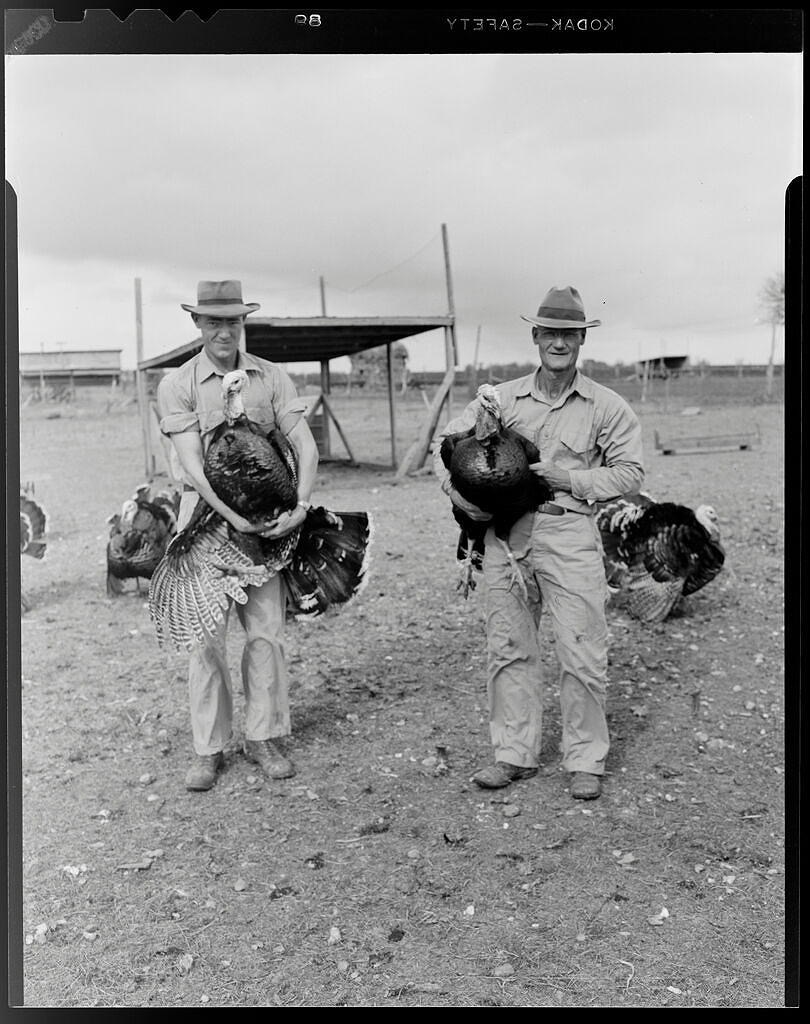
Harry Annas:
Untitled [two men holding turkeys] (c. 1950)
"We're willing to go through Hell to receive that blessing."
The Muse and I start our annual search for Giblets as the holidays approach. When we lived closer to the beginning than the end of this economy's supply chain, our search was never in vain, for supplies of everything seemed more certain. We'd often drive a hundred miles to find some fresh citron, a point of considerable seasonal frustration, but Giblets were common and widely available then. Here, nearer the Center of the Universe but further from the source of much, supplies are such that it seems more a matter of luck than anything when we manage to assemble our seasonal essentials. It would be much simpler if we had ever managed just to lie down and accept the inevitable homogenization of even our most heartfelt celebrations. Had we settled for whatever we quickly found, we would have eliminated our seasonal running around. Still, as entropy continues trying to eradicate all tradition, it's gotten to the point that we take it as a personal challenge to continue our mission unto perdition if necessary. It sometimes seems essential.
I might refer to as Giblets any picky addition anyone deems necessary to properly celebrate.
TheRains

Helen Hyde: In the Rain (1898)
"I might just as well be hibernating."
All the week before, I worked like a man possessed, for word on the street predicted their arrival. There would be the time before and then the time after, and I had work to complete before the time before ended. I admit that mine was a bogus alarm, for nothing would be won or lost whether or not I successfully prepared. I sometimes construct phony deadlines to goose myself into action. I suppose everyone does. Still, my concern seems real. I drive myself. I exceed my capacities and work through my lunch, exhausting myself as if I was making a difference—an as if that seems to work regardless of whether that difference matters. I cleared the yard of leaves before TheRains arrived, satisfying myself and maybe saving some additional effort. A soggy leaf pile, the approximate volume of a Volkswagen bus, hugs the curb out front. It seems like the largest on the block, a point of considerable pride for me and my underlying bogosity.
In my youth, I often constructed deadlines for myself.
Leavfing

Karl Gustav von Amling: Autumn (1698)
" … really looking like home."
I harvest a prodigious crop of leaves each autumn. I take great pride in scraping my yard bare before the snow starts falling and in time for the final municipal leaf collection. I think of this work as a civic responsibility, but I actually do it for myself, for no other activity provides the opportunity to practice one of my minor masteries. I'm very good at raking leaves. Leaf raking can be a frustrating business, for they're surprisingly heavy, and even when they fall light and airy, they cannot be meaningfully condensed and must be removed in tiny stages. A tarpload of wet leaves weighs hundreds of pounds and feels like dragging a carcass across the lawn. A steady pace succeeds where brute force fails. Leave-taking tries patience.
It's chess played on a grander scale, requiring strategy and tenacity in more or less equal measure.
Writing Summary For The Week Ending 11/16/2023
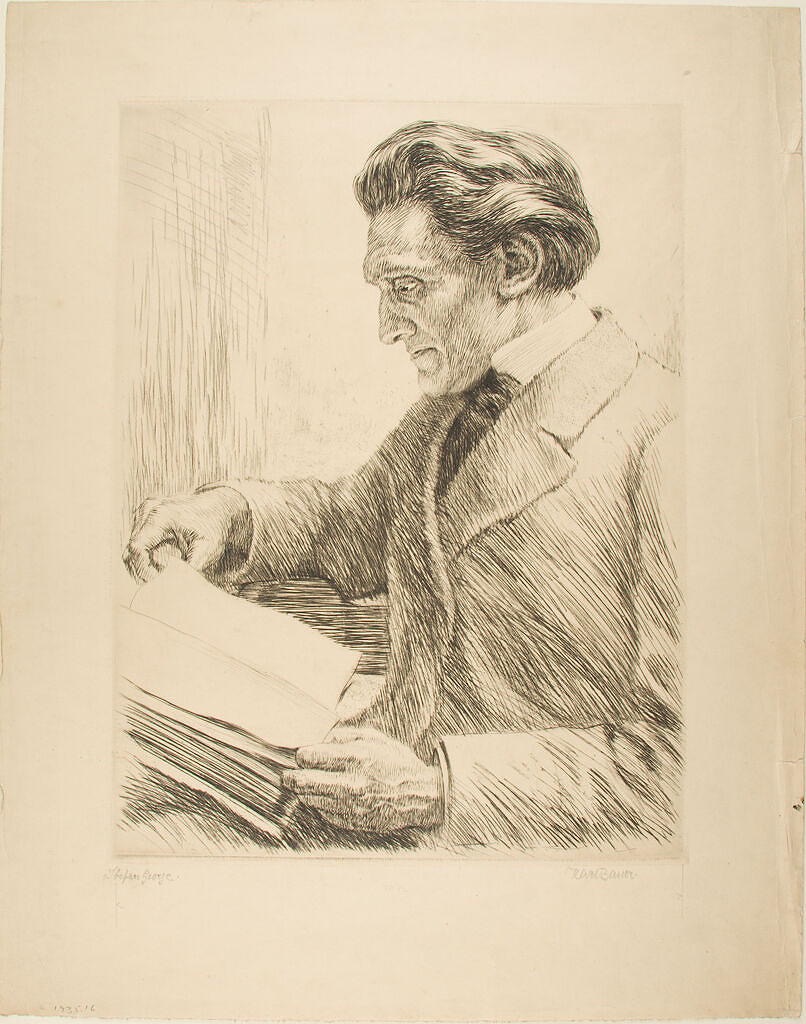
Karl Bauer:
Portrait of the Writer Stefan George
(19th-20th century)
When It Made Me Special, I Was Less For It
I once worked in a place I had to commute to by airplane. My work week involved predawn departures and late evening arrivals with a corporate apartment where I could never remember whether the refrigerator needed milk. I spread myself thinly then, continually leaving, saying goodbye more than I ever said, "Hi!" I learned to live alone. I almost became self-reliant but failed the exit exam. I often felt empty-handed, dependent upon resources I'd left on the other end of my commute. Traveling now dredges up those memories of when it mattered to me that I got upgraded when I'd accumulated more frequent flier miles than Croesus ever did, when I’d garnered recognition. Now, I'm relegated to the last boarding group, hopeful to be the last one on board. I'm assigned the window seat without a window or the last row, where the seats can't recline. I hope for a fussy baby nearby. I never reclined my seatback, always wary of inconveniencing anyone behind me, even if the person seated before me wasn't so thoughtful. I travel to remember why I stay home. I see it as a necessary evil, a means to another end, a mere bookend. When it made me special, I was less for it.
FinishedSketches
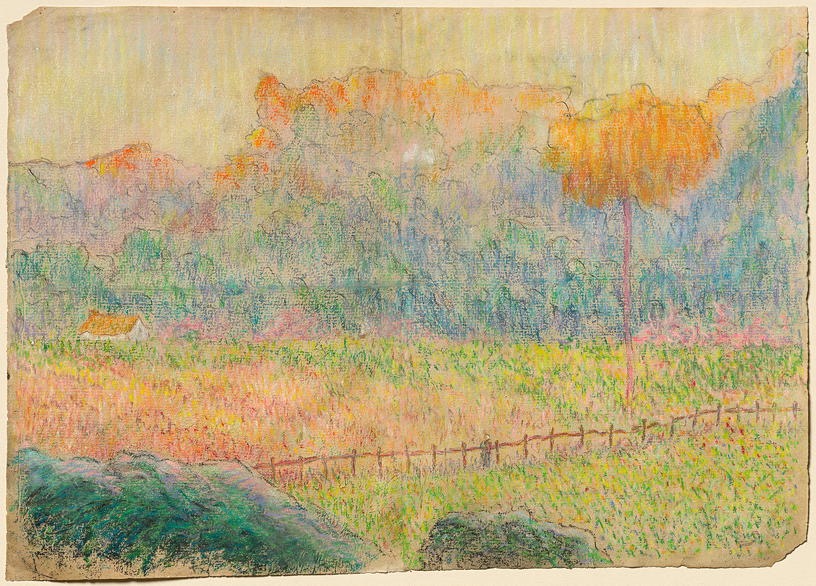
Claude-Emile Schuffenecker:
Study for "Landscape with Figure and Houses" (c. 1891)
" … precisely what she's so confidently projected …"
The Muse figures that, based upon remaining ballots and her win rate so far, once the final ballot count finishes, she will have garnered 8,126 votes, precisely the number she projected she'd need to win before she even began her campaign.
In April, The Muse roused me from whatever more critical activity I was doing to sequester me in the largely unused front upstairs room.
SeparationDance

Artist unknown: The Dancing Fox (1766)
"By this time tomorrow …"
By the final day of an excursion, the new has worn off. Discovery, which dominated the first days, no longer rules. We know how to get from here to everywhere. We've stumbled upon enough to fully satisfy our objectives yet we still have a day to fill. We've grown listless, muscles remembering the first day's exuberance. We're sanguine, almost indifferent. We barely manage to feed ourselves.
We fill in with the remaining items we promised ourselves we'd see, but these were never our primary purpose, and they only partially satisfied.
Glimpsing
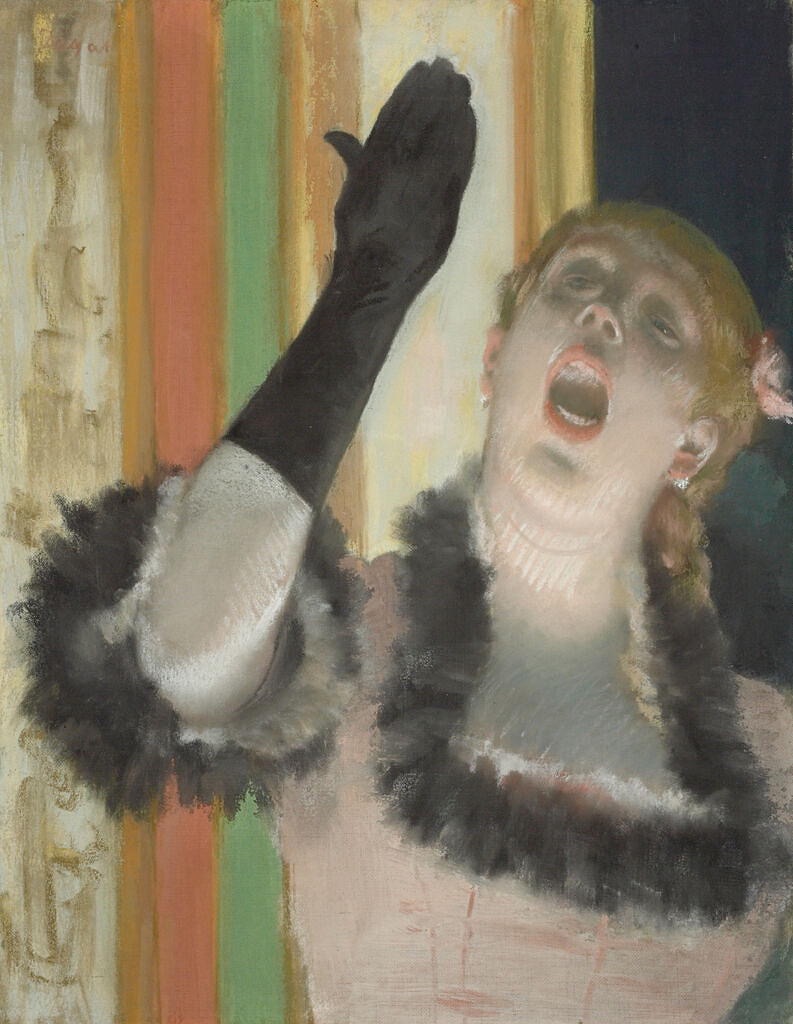
Hilaire-Germain-Edgar Degas:
Singer with a Glove (c. 1878)
" … what should I make of that?"
Gurus insist that emptying the mind encourages these experiences, though I, who've never once managed to quiet my chattering monkeys, notice perhaps more than my fair share. You know what I'm speaking of here: the Glimpsing of the extraordinary lurking within the otherwise most ordinary situation. A wrinkle in space or time impresses upon your consciousness, producing a glimpse of the profound when you had no intention of stumbling into any such encumbrance there. You were just going about your ordinary business when the infinite intruded, when beauty or profound truth or the eternal dropped in and left you breathless. Some of us experience this sensation more than others, or so we all seem to believe, though not one possesses any factual basis to hold this conviction. It might be that we're all constantly Glimpsing, that we need no special training to encourage it other than perhaps to remember to pay attention, though failing to pay attention seems to encourage it, too.
Traveling tends to increase the number of Glimpsing events, perhaps because, out of ordinary circumstances, more things just qualify as eye-catching, as unusual enough to attract this sort of attention.
Museuming
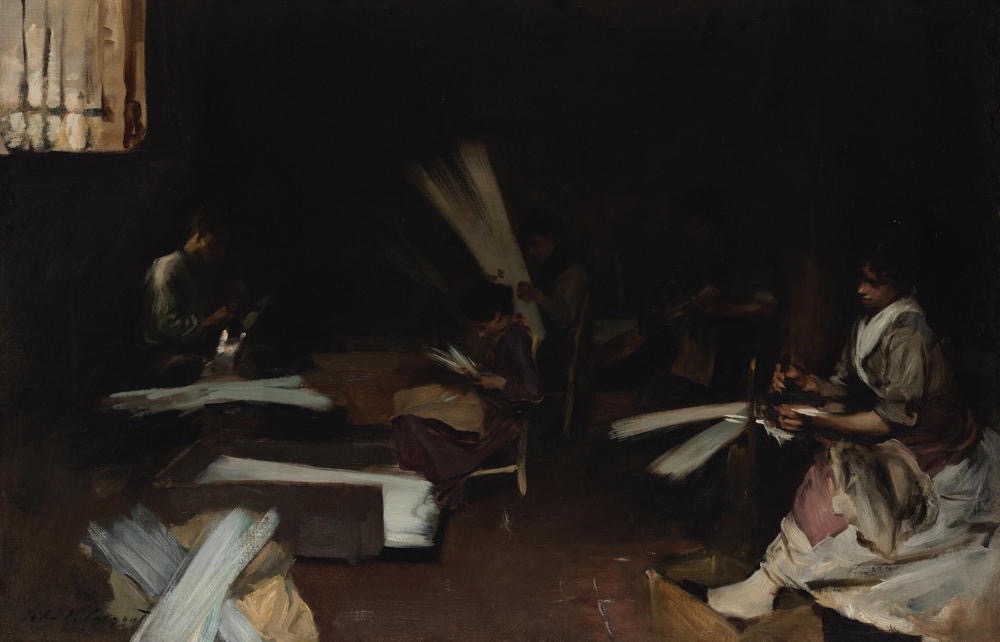
John Singer Sargent:
Venetian Glass Workers (1880–82)
" … none of them the one the artist might have intended."
As The Muse and I waited to board our flight out of The Valley Near The Center Of The Universe, I used that idle time to check messages. Like you, I maintain a tenuous relationship with my iPhone. I utterly rely upon it while it continually disappoints my expectations. I often fail to receive notice upon receipt of a text message, so I usually go for days before discovering that I received one. People have come to use texting more often than calling, which means that attempts to contact me almost always fail to reach me at first. The worst-case scenario involves a real emergency where the informing party texts me. A week or so later, I might saunter into my Messages app to find a smoldering ember remaining from some three-alarm fire.
This text had come early the previous morning, informing me that my new lenses were in.
SmallestTown
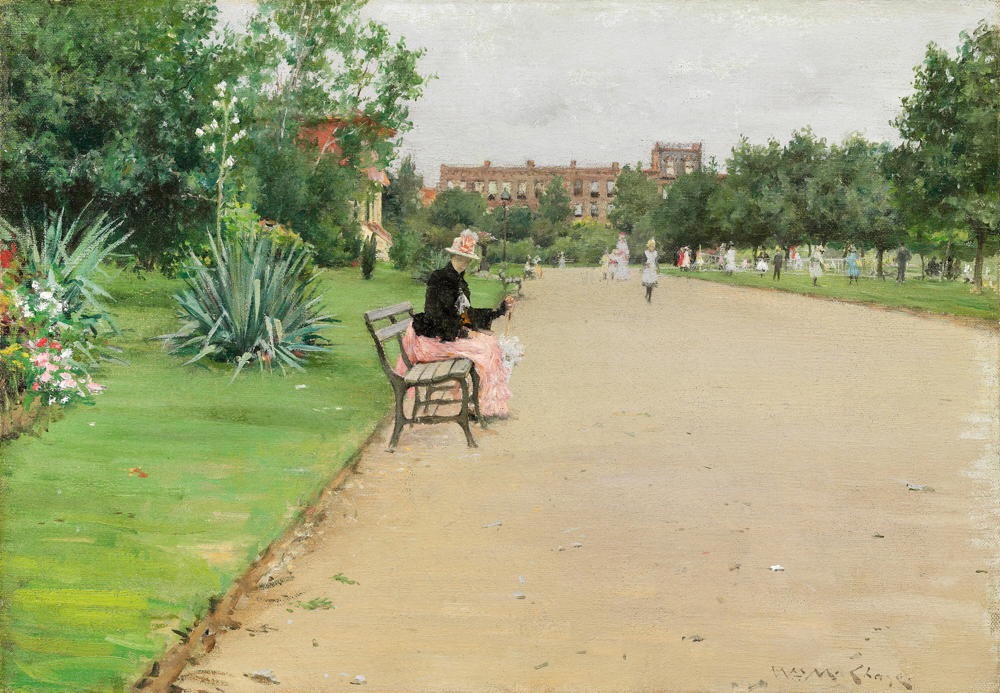
William Merritt Chase: A City Park (c. 1887)
"It sure feels like home."
Though I hail from a small city, I do not even pretend to represent the interests of small towns or their people, for mine's not the smallest or the largest town in that category. No, the SmallestTown I've ever visited must be New York City, for it represents everything a small town or city should properly embody. I know it does appear to exhibit a somewhat inhibiting size, which would seem, at first glance, to disqualify it as if not a smallish place, then certainly as the smallest. Yet I insist New York City is the perfect example of the SmallestTown I've so far found. I won't pretend that other contenders might exist, but I will insist that I stopped searching after visiting here and discovered perhaps its most closely held secret: its size.
You see, this place is not a single place but a series of tightly nested and uncontested neighborhoods, each featuring remarkably few people, each of whom understands their place.
Reveling
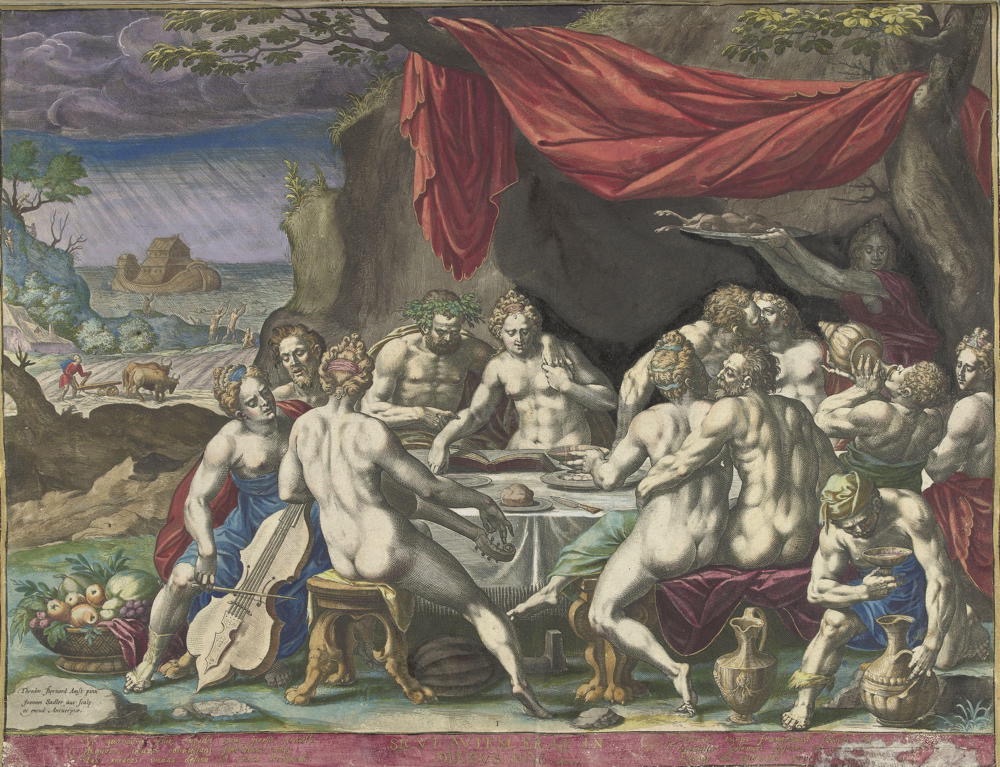
Johann Sadeler: De mensheid voor de zondvloed
[Humanity before the flood] (1581 - 1585)
"Excess is not synonymous with success …"
In New York City, to celebrate The Muse's campaign victory, we're faced with how we might go about Reveling in the success. The traditional wine, women, and song won't work with The Muse involved, so we settle for wine, dinner, and song. The musicals we're scheduled to see should adequately cover the song part of our Reveling. We discover that we've booked a hotel on the fabled Tin Pan Alley, an auspicious sign if ever I've encountered one—the wine we handle with a decent Aglianico, purchased in a lovely little Italian bistro. We're seated in a basement annex, perfectly out of the usual distracting noise and bustle, with a waitress whose accent I cannot begin to wade through. Fortunately, The Muse makes sense of her sentences, and we settle in for a celebratory feast.
After a day of fasting on the cross-country flight, we're famished.
Writing Summary For The Week Ending 11/09/2023

Stefano Della Bella: Boy Writing (17th century)
I Wonder If I Ever Leave
I should be packing, but here I am writing again. The Muse and I intend to spend a few days away to kickstart the recovery from six dog months of campaigning. The transitions seem the most troublesome, for they offer little to distract one from all that's suddenly missing. The routine no longer needed, and no replacement routine ready yet; we figure we'll be better off far away from our usual surroundings, wandering. I continue to hold my precious patterns, writing rather than packing, condensing departure into a frantic few minutes. I expect to forget something important, but not my writing, my constant companion, my one abiding obligation. I do not know what I would be doing if I was not describing something. I take no vacations from my vocation. I take my obligations with me when I go. I wonder if I ever leave.
Palning
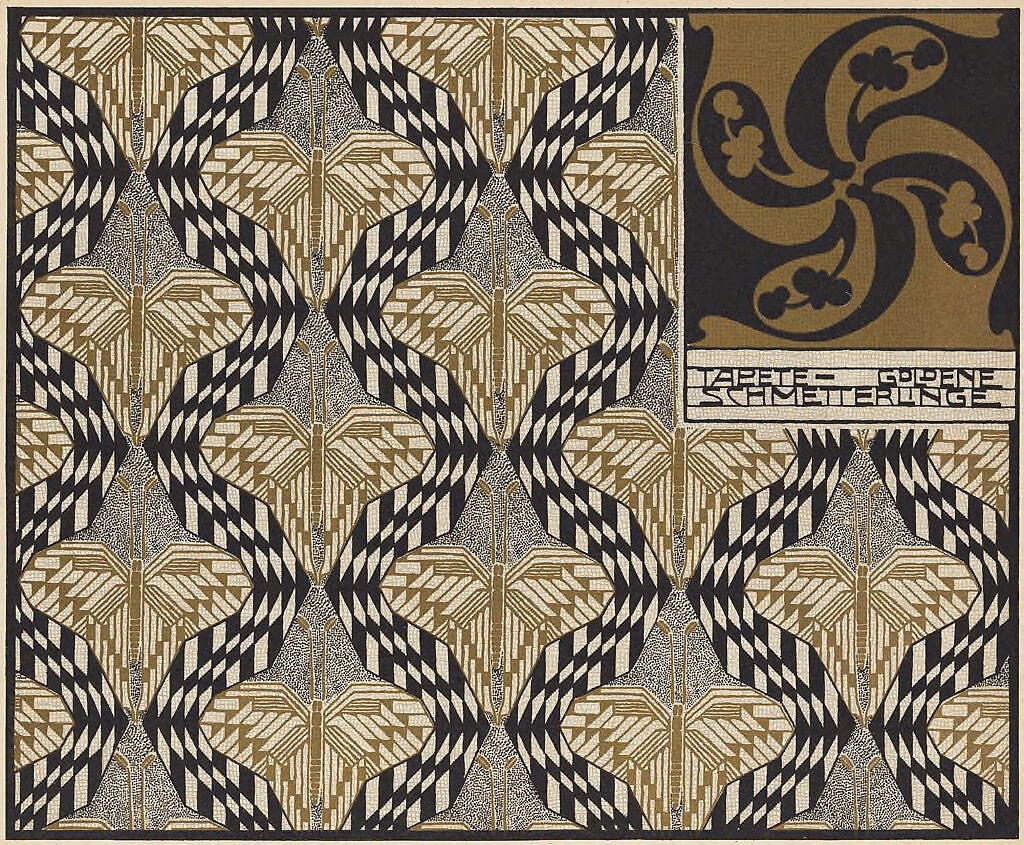
Koloman Moser: "Golden Butterflies" wallpaper design
from the portfolio "Surface Decoration" (1902)
"… better to disappoint ourselves by sequencing our desires …"
Planning for a few days’ respite in New York City, I again encounter my embarrassing relationship with planning. Though I spent the bulk of my working life actively engaged in planning, I have always been lousy at it. I might have been attracted to the activity merely because I performed it so poorly. I might have mistakenly believed practice would eventually resolve this increasingly glaring shortcoming, but it hasn't. I worked my way up the career ladder instead, moving on from participating in creating plans into teaching others how to do what I had clearly never mastered. I might have even risen to the peak of my ineptness there, embodying every element of the infamous Peter Principle, rising to inhabit the pinnacle of my incompetence. My heritage and legacy stand there, a testament to man's inherent inhumanity, how one might embrace their inability rather than master something for themselves.
This might be the most human trick, the call of desire muffling reasoning.
ComingUpRoses

Koloman (Kolo) Moser: Woman’s Head with Roses (1899)
"That sweet scent sure seems familiar …"
In the 1959 Broadway musical Gypsy, songwriter Jule Styne and lyricist Stephen Sondheim created a song they intended to sound as if it had been a common idiom for ages. They succeeded with a repurposed melody and Sondheim's remarkable turn of the phrase, creating what would become star Ethel Merman's signature song, Everything's Coming Up Roses. When first introduced to the tune, show director Jerome Robbins asked, "Everything's coming up Rose's what?" Fortunately, Sondheim accurately predicted that nobody would be asking that question after hearing the song, which has since become one of the standard soundtracks accompanying success, so when The Muse appeared to win her election for Port Commissioner, this melody popped into my head and hasn't yet left. It's become the earworm for what promises to be a new age here.
Some days, everything shifts. Something of actual consequence happens, and whatever remnants of any odd old status quo cannot make the shift.
JudgementDay
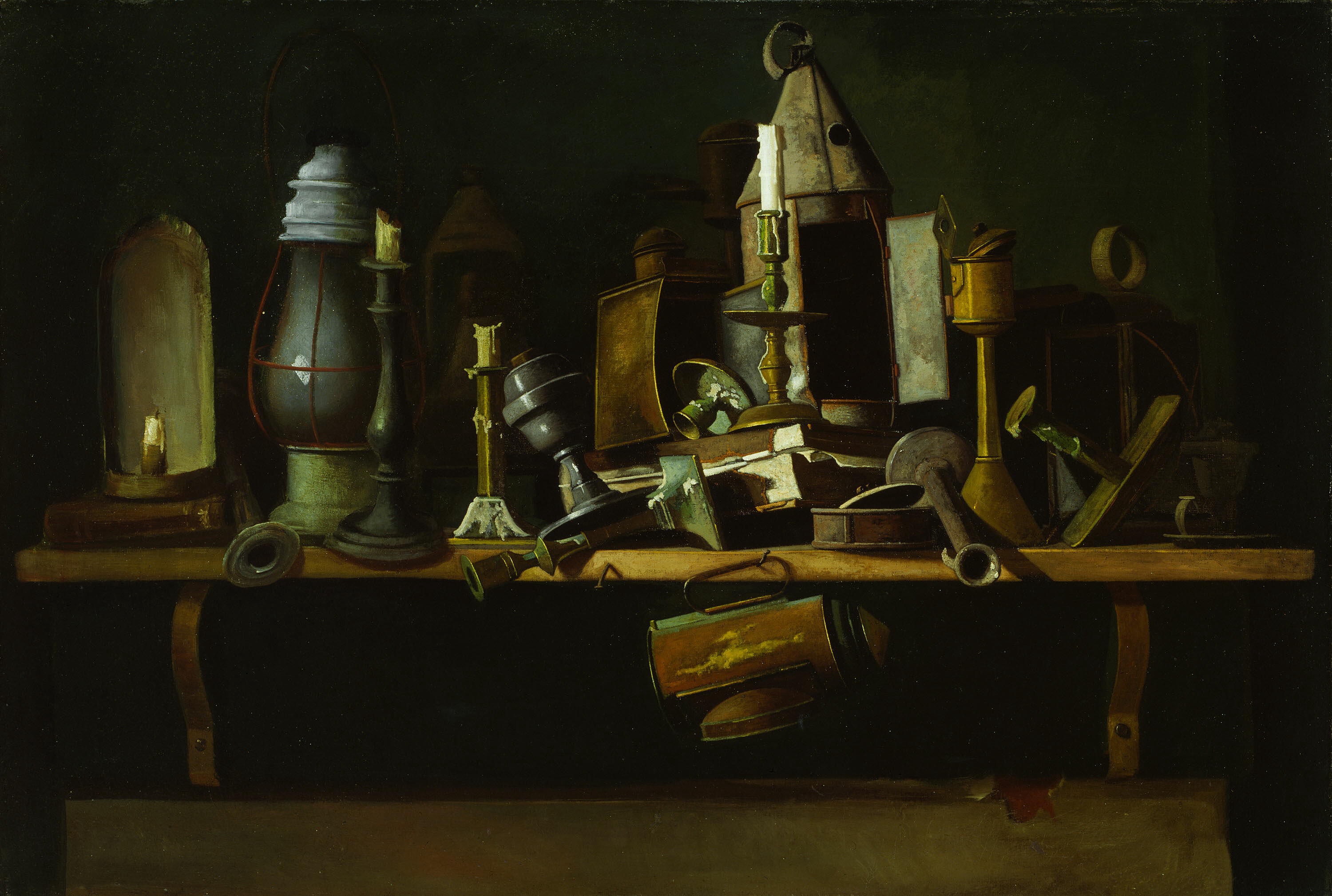
John F. Peto: Lights of Other Days (1906)
"That difference will not be undone."
Six months ago, The Muse began her campaign by researching histories of local campaigns to discover what had gone wrong and right so that she might focus upon elements likely to help her get elected. She feigned disinterest, insisting that she was just weighing the pros and cons to decide, but she had already decided to run. Her only questions were about how to productively pursue that end. She registered as a candidate on the first day registration opened. She rented a post office box, set up a bank account, and set about designing her campaign's look and feel, and while she had help, she decided. She chided me into volunteering as her campaign manager, a role I later renamed Campaign Mismanager, a title that better described my contribution. Please make no mistake: I played the role of placeholder. She managed her own affairs.
There should have been a rule that spouses couldn't serve in any formal role on any campaign because a couple's peccadillos couldn't help but go on public display whenever that occurred.
Oven

Jan Joris van Vliet: Baker (1635)
" … the answer approaches the infinite."
I never was anybody's baker. Oh, I have proven capable of roasting the odd chicken at three hundred fifty degrees for an hour and slowly braising a pan of pork cheeks on a bed of seasonal veg for longer, but the more intricate recipes I leave to The Muse. Bread has always been beyond me, for instance. I've convinced myself that my shortcoming stems from my dyscalculia, my inherent inability to perform specific calculations, for an Oven operates on a complicated table of equivalents, variables requiring understanding to balance. To complicate this calculus further, The Muse bought a Combi Oven Christmas before last. This Oven is an Oven on steroids. It adds an additional heat source (top, bottom, and back), steam, and a fan to create conditions utterly unanticipatable by this man. If I fly blind operating a standard Oven, I fly comatose with this one.
I ironically call this Oven my EZBake Oven in homage to the light bulb-operated one my sisters had when we were kids.
DarknessSavingsTime
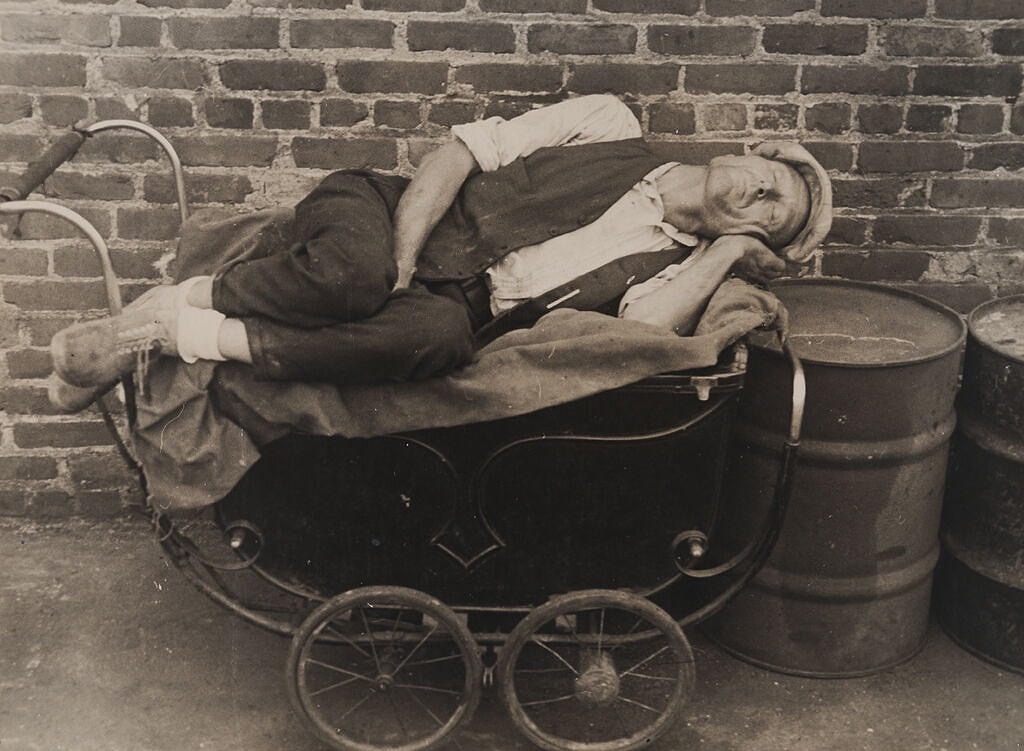
Ben Shahn:
Untitled [Cherry Street, New York City] (1933-1935)
"To not do so seems inhuman."
I am told that I have sometimes accepted change as if I were a mature adult. Not often, mind you, or necessarily memorably, but I apparently have some track record. Still, nobody's surprised when I react to some change by kicking and screaming; obviously, I'm not always able to help myself. The progress of humankind seems especially ragged sometimes, so it's little surprise that my maturity fades in and out accordingly. I, for instance, have always considered Daylight Savings Time to be humankind's finest invention, mainly because it had no moving parts yet carried a profound positive influence. It required compliance, nothing more, to work its magic, and it managed to achieve that compliance without resorting to marshaling tactics. People obeyed without more than minor grumbling. Everyone benefitted!
So it's understandable when backsliding brings out the worst in me.
Between
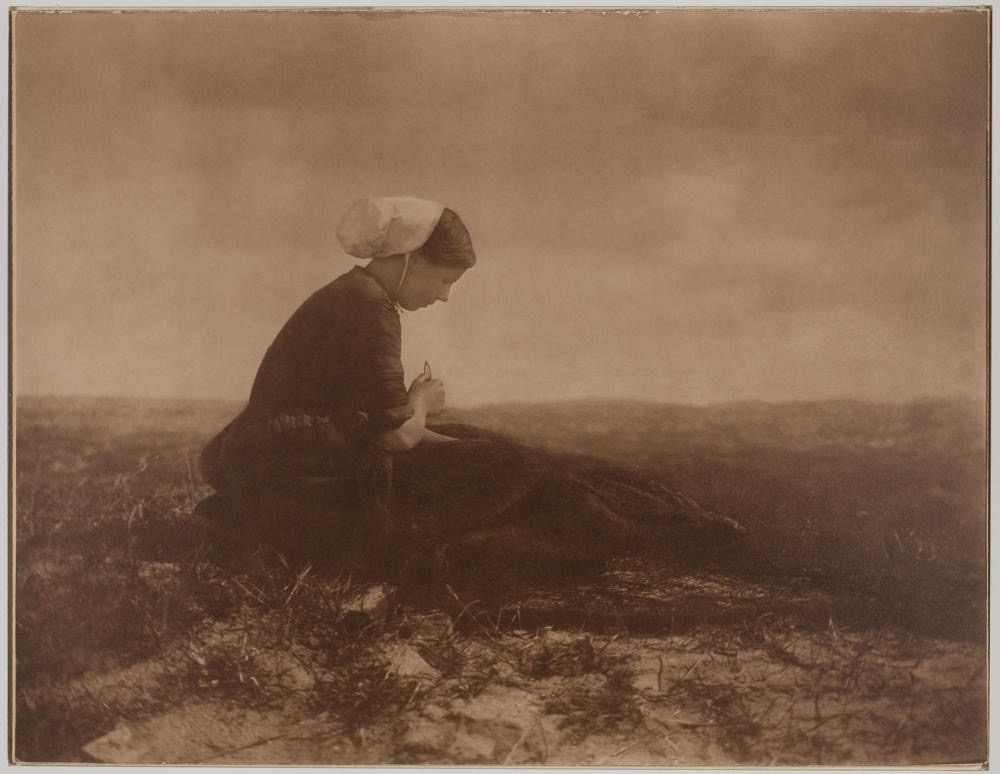
Alfred Stieglitz: The Net Mender (1894)
" … when all finally seems right enough with this world."
I find myself Between passions. The Muse's campaign all but over, my contribution finished, and my next passion pending; I feel at more or less loose ends. I presently have no particular end in mind. Not even our impending excursion to New York City interests this homebody. I move listlessly, as if little matters, probably because very little seems to matter at this moment. I understand that I'm supposed to be actively engaging, appreciating my good health while I still have it, flaunting my lack of physical complaints. I have no complaints. Disappointments haven't tainted my outlook. I've harbored no grudges. I've not been wronged. Nor have I taken it upon myself to change this world, however much it might scream for someone's intervention. Archimedes taught me everything I understand about leverage, and I feel certain there's no fulcrum sufficient to change even a willing world, and ours doesn't appear to be all that willing to me.
I rise at my usual time but lengthen my preparation.
Becoming
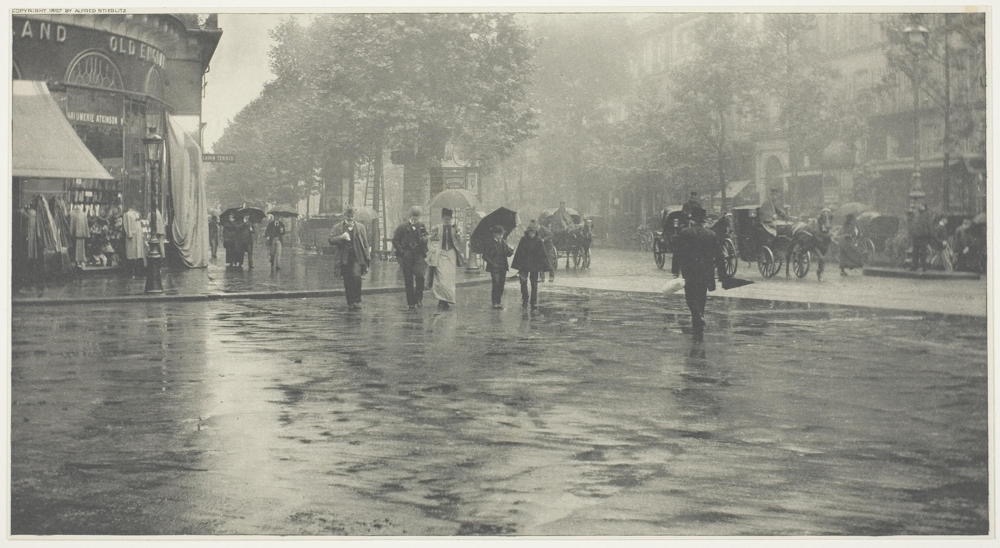
Alfred Stieglitz: A Wet Day on the Boulevard, Paris (1894, printed c. 1897)
"Becoming seems to be what we really are when we insist that we are anything at all."
Defining "done" was one enduring difficulty every project I ever worked on, led, or consulted with experienced. Some adopted the curious First Customer Shipped metric, which insisted that the project was done when the first customer's order was free on board a truck. Others presumed that the project had successfully tested fixes for and integrated all critical bug reports. In actual experience, though, the project team inevitably continued their efforts long after the designated completion date, for that first customer, upon receiving the first instance of the final product, would experience unanticipated difficulties that only the development team could resolve and additional critical bugs would emerge even after testing and integration were successfully completed. Eventually, the end product would be more or less integrated into the finished product maintenance stream, though members of the original development team might only partially divorce themselves from the product.
I learned that whatever the product developed, it never left a state of becoming.
Writing Summary For The Week Ending 11/02/2023
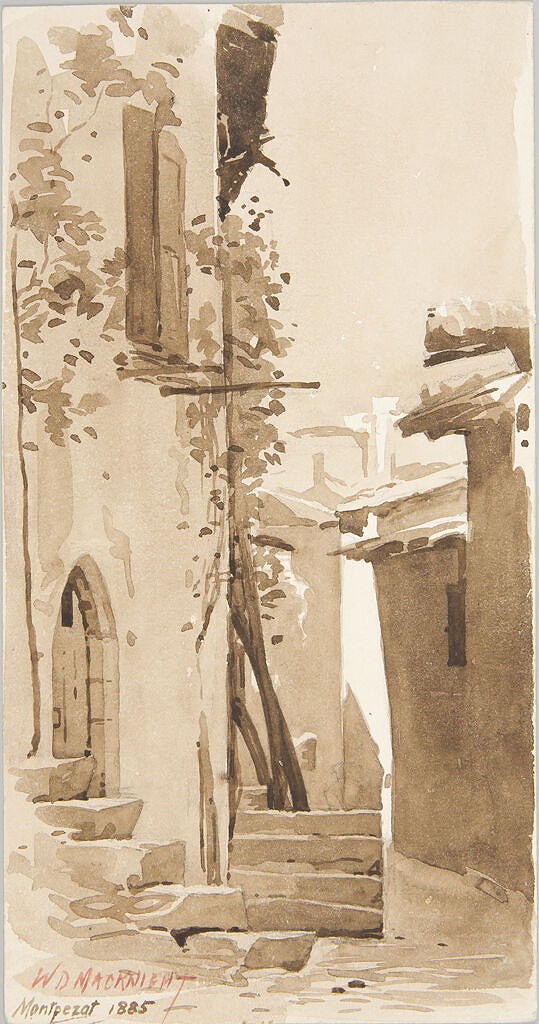
Dodge Macknight: A Narrow Way, Montpezat (1885)
More Complex … Not In Need Of Further Simplification
I am increasingly convinced that none of us understand what's happening around us. We unknowingly speculate. The purpose of civilization sometimes seems to protect us from knowing the purpose of our civilization, for it seems in odd moments to be conspiring against us, against us ever understanding our purpose here. It insists, for instance, that we focus out there, as if out there might hold the secrets to ourselves. We, in turn, might counter with introspection, insisting that our essence might be better defined in absentia of our context. In practice, we might be both-and animals, neither feral nor conditioned, neither learned nor especially ignorant. These transition weeks tend to highlight these inherent contradictions. We aspire to be able to declare some simple definitions. We tend to eventually learn that we were both more complex than that and certainly not in need of further simplification.
Change

Dodge Macknight: Rain (19th-20th century)
"The living actively practice forgetfulness …"
"And if you achieved that, how would you know?" My consulting clients always struggled with this question, for wanting seems an inherently subjective experience while describing aches for more objective specificity. A raft of difficulties always emerged whenever I asked this question, and, indeed, I never knew how to answer it, either, for it teeters on the edge of Fundamentally Undecidable. It might not matter how anyone answers. It mattered more that someone struggled to respond, for a deeper understanding can't hardly help but come from the struggle to answer. I asked the question to encourage insight more than a definitive answer, anyway. Rarely would any client produce an answer they found completely satisfying. Inducing that dissatisfaction might have always been my deeper purpose in asking, for there are few things worse than a cock-sure client who believes that they'll know change when they see it. We might all be much better off accepting inherent ambiguity than precisely knowing. Few future things benefit from precise proposals.
I knew, or at least strongly suspected, that we would not need much specification before beginning.
Effolution
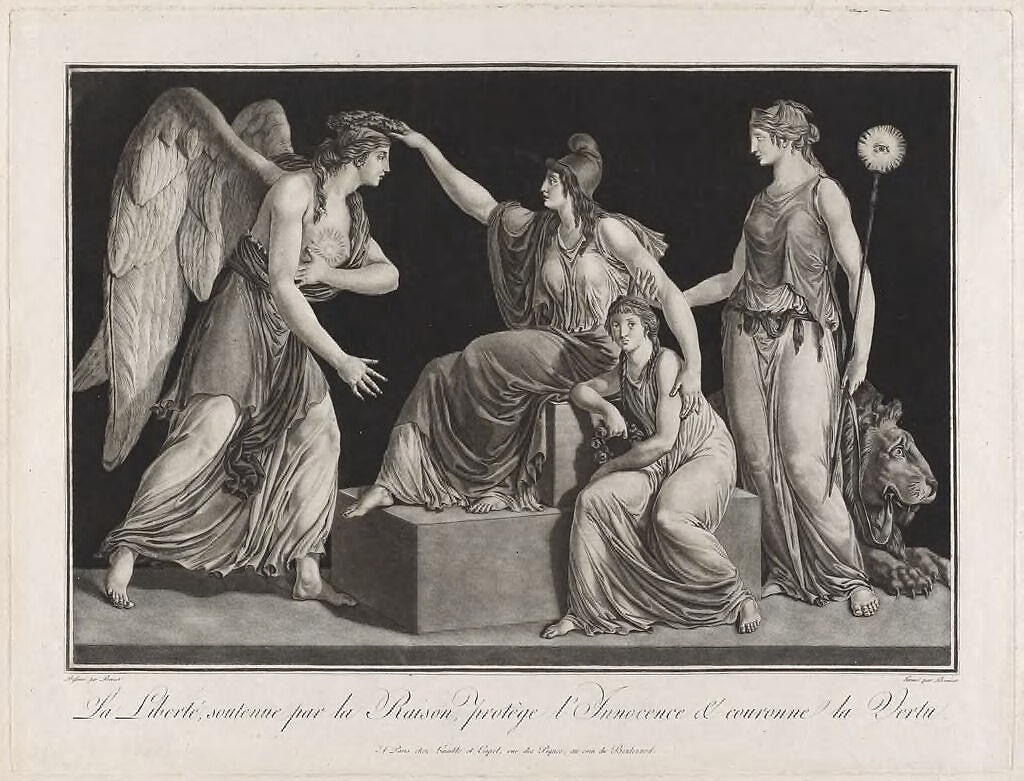
François Bernier:
La Liberté, soutenue par la Raison,
protège l’Innocence et couronne la Vertu
[Liberty, Supported by Reason,
Protects Innocence and Crowns Virtue]
(1793)
" … just buy a replacement whenever their dreams need repair."
This culture believes in positive progression, perhaps above all else. Our future has always been destined to be better than our parents. Our sons will be better off than we ever were. Whether through evolution, revolution, or simple propulsion, we would move ever forward, ever onward, upward, and away. While this notion might represent reality across decades, generations, or centuries, the actual on-the-ground experience of these -volutions tends to be much messier than expected. We didn't, for instance, evolve from Neanderthal to human in a single generation. Many trials and inevitable errors emerged. I suspect this shift involved all of the usual struggles our cerebral models tend to ignore. We crawl forward more than march and might move backward on the way. Straight and narrow paths exclusively belong to myths.
As a kid, I was fed a steady diet of myth.


